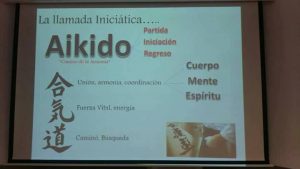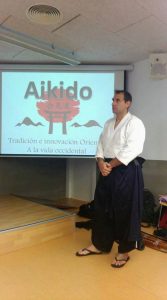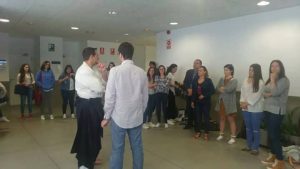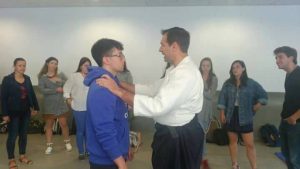Esta entrada también está disponible en: Spanish
Recently, our Sensei Antonio Quero gave a lecture at the University of Málaga about the tradition and oriental innovation applied to Western life.
Thus, he affirmed that we must be realistic in daily attitudes and know that “happiness is not the social position, the perfect partner and everything ‘ideal’; it is not a station to be reached, but the result of the way of traveling”.
“In our Western culture,” he explained, “we have a profoundly trained predisposition to absent ourselves from the present moment. On the other hand, the Orientals know that it is full presence that makes any learning possible, and the result will come later. Being present and commited to the process is the best option to learn more and to reduce the chances of ending up in a showdown”.
Similarly, the sensei emphasized how in Eastern culture, any activity is used as a personal exercise to cultivate oneself. “This applies to martial arts, ikebana (floral art), the tea ceremony, and an infinity amount of daily activities. This philosophy of life causes them to undertake their tasks with minimal importance to the ultimate goal and to place more emphasis on the way to get to it”, he said.
All this connects with aikido, which purpose is the practice itself. “Aikido positions itself as a beacon in the midst of the storm of conflict, of stress, of non-communication, of our daily avatar, creating an ideal point from which to develop dialogue, as well as opportunities that dissolve the tensions”, he theorized.
To achieve this, this discipline teaches, in the words of Quero, “breathing techniques, to look at ourselves and check in, to centralize the body, to meditate, to improve listening and intuition, to develop emotional intelligence and dialogue skills…”
“Unlike the conventional style based on control, we have to rediscover ourselves first in a constant process of discovery, based on values that lead us to be consistent with our actions, to evaluate if we are ethically correct in our decision making, to learn to see and communicate with others from the point of view of an equal…”, explained the teacher to illustrate the fact that it is not necessary to be an aikidoka to apply the principles of aikido in our daily life.

 English
English Español
Español 


